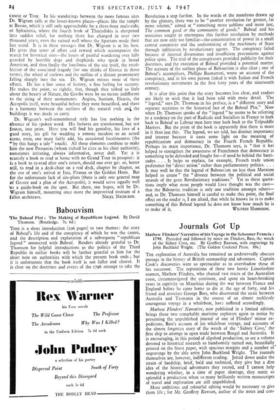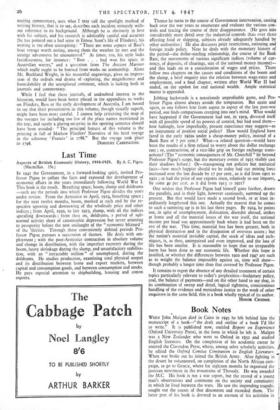Journals Got Up
Mathew Flinders' Narrative of his Voyage in the Schooner Francis : 1798. Preceded and followed by notes on Flinders, Bass, the wreck of the Sidney Cove, etc. By Geoffrey Rawson, with engravings by John Buckland Wright. (The Golden Cockerel Press. 88s.)
THE exploration of Australia has remained an undeservedly obscure passage in the history of British seamanship and adventure. Captain Cook's discoveries were so spectacular as to overshadow those of his successor. The reputations of those two heroic Lincolnshire seamen, Mathew Flinders, who charted vast tracts of the Australian coast, circumnavigated the continent, and spent six heart-breaking years in captivity on Mauritius during the war between France and England before he came home to die at the age of forty, and his friend and associate George Bass, who discovered the strait between Australia and Tasmania in the course of an almost recklessly courageous voyage in a whaleboat, have suffered accordingly.
Mathew Flinders' Narrative, now published in a limited edition, brings these two remarkable maritime explorers again to notice by presenting the unpublished journal of one of Flinders' minor ex- peditions, Bass's account of his whaleboat voyage, and accounts of the almost forgotten story of the wreck of the ' Sidney Cove,' the first ship to attempt to open trade between Bengal and Australia. It is encouraging, in this period of slipshod production, to see a volume devoted to historical research so handsomely turned out, beautifully. printed on the finest paper, with spacious margins and a number of engravings by the able artist John Buckland Wright. The journals themselves are, however, indifferent reading. Jotted down under the strain of hardship, brief, bald and technical, they give but a dim idea of the historical adventures they record, and I cannot help wondering whether, in a time of paper shortage, they merit so splendid a production when so many brilliantly written manuscripts of travel and exploration are still unpublished.
More ambitious And colourful editing would be necessary to give them life ; for Mr. Geoffrey Rawson, author of the notes and con-
netting commentary, uses What I may call the spotlight method of writing history, that is to say, describes each incident minutely with- out reference to its background. Although he is obviously in love with his subject, and his research is adnfirably careful and accurate (he has pointed out a bad error in Ernest Scott's life of Flinders), his writing is too often uninspiring : " There are some aspects of Bass's boat voyage worth noting, among them the weather he met and the strange adventures he encountered." At times, too, his style lacks fastidiousness, for instance : " Bass . . . had won his spurs in Australian waters," and a quotation from The Ancient Mariner which really ought to be banned from works on seamanship. Alone Mr. Buckland Wright, in his masterful engravings, gives an impres- sion of the ordeals and drama of, exploring, the magnificence and formidability of the unexplored continent, which is lacking both in journals and commentary.
While I feel that these journals, of undoubted interest to the historian, would have been better placed in the appendices to works on Flinders, Bass or the early development of Australia, I am bound to say that their presentation in this volume, though visually superb, might have been more careful. I cannot help criticising the map of the voyages for including too few of the place names mentioned in the text, and surely a glaring misprint in the opening sentence should have been avoided : " The principal feature of this volume is the printing in full of Mathew Flinders' Narrative of his brief voyage in the schooner ' Francis' in 1788." But the voyage took place







































 Previous page
Previous page